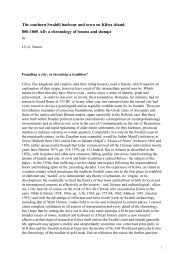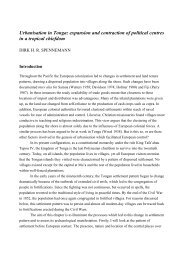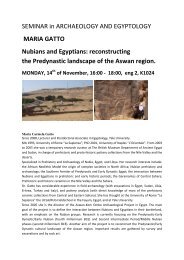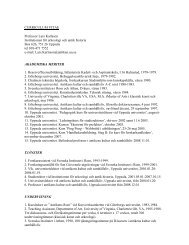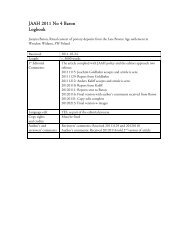Beowulf - Institutionen för arkeologi och antik historia
Beowulf - Institutionen för arkeologi och antik historia
Beowulf - Institutionen för arkeologi och antik historia
You also want an ePaper? Increase the reach of your titles
YUMPU automatically turns print PDFs into web optimized ePapers that Google loves.
proud, if he had composed them himself, and pleased the audience even if the verses<br />
were common stock:<br />
Hige sceal þé heardra, heorte þé cénre,<br />
mód sceal þé máre, þé úre mægen lýtlað.<br />
Her líð úre ealdor eall forhéawen,<br />
gód on greote; (Maldon vv. 312–315).<br />
Mind shall be the harder heart the more bold<br />
pride shall be the greater as our strength grows less.<br />
Here lies our earl all cut-down<br />
good on the earth;<br />
Byrhtwold is by no means the first to die; on the contrary, he comes after Ælfwine,<br />
Offa, Leofsune, Dunnere, Æscferth (who speaks) and Edward, Ætheric, Wistan and<br />
Wighelm’s son, who step forward to fight and die together with Oswold and<br />
Eadwold, who speaks just before Byrhtwold. After him Godwin (not the cowardly<br />
Godwin) steps forward to fight and die. This series of people is presented in no<br />
apparent order or rather deliberately without any order, high and low, talkative and<br />
silent, some defined by their own name, one by his father’s and some by both. Together<br />
with Eadric, Wulfstan, Ælfhere, Maccus, Wulfmær, Ælfnoð and the three<br />
cowards Godric, Godwine, Godwig, there are roughly 20 men around Byrhtnoth,<br />
and those who go forth after Byrhtnoth’s death are there to represent his people in a<br />
wider sense, not just his best soldiers.<br />
Who the retainers were, in terms of merit and descent, and why they were chosen<br />
by Byrthnoth in the first place is of little consequence. The point is that when the Earl<br />
of the East-Saxon people picks out a bodyguard and when the poet needs to point<br />
out a people, then they are both looking for a group of men whose ability and will to<br />
act as good men is not linked to class, descent or age.<br />
It seems possible that Byrhtwold’s use of the word good signals the rounding off<br />
of the poem’s battle scene, and the line of men going forth to die is close to being<br />
tedious. That may of course not have bothered the author, who obviously had a<br />
catalogue to present, but in that case it is a happy coincidence that Byrhtwold expresses<br />
himself so well. It is his role to be old and to sum up, without forgetting his<br />
loyalty to Byrhtnoth. He is splendid in his old age, even better than <strong>Beowulf</strong>, whom<br />
young Wiglaf had to remind of his youth when he expected that <strong>Beowulf</strong> would be<br />
reluctant to reopen his death-bringing fight with the dragon (<strong>Beowulf</strong>, vv. 2663–<br />
2668). Byrhtwold’s speech is, in other words, an approach to old age as well as to<br />
the end of the battle and of his life, which by the way is of little consequence. Growing<br />
old and maintaining the ability to judge a matter well, while sticking to ideals<br />
formed in our glorious youth, is, to say the least, not an easy matter.<br />
If it can be accepted that the good represents a framework and an underlying<br />
75



